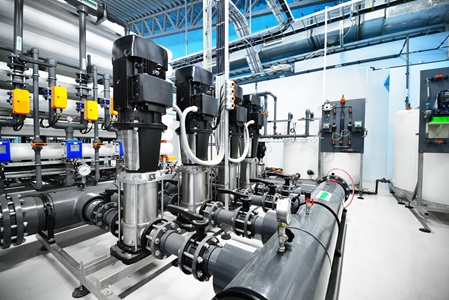We attach great importance to robust industrial designs and all systems are characterized by a simple system structure. The modularity enables flexible use and uncomplicated expansion as required. The processes and systems make it possible to economically implement even complex requirements, both stationary and mobile.
The process used depends, among other things, on the type of water contamination and the target quality.
Areas of application
- Drinking water
- Process water
- Boiler feed water
- Water recycling
- Ultrapure water
- Waste water
- Process media
- Seawater treatment
Membrane systems
Typical areas of application (excerpt):
Seawater desalination | desalination of boiler feed water | industrial waste water treatment | drinking water filtration | process water treatment | water recycling | separation of organic solutions | active ingredient enrichment | filtration of beverages | oil-water separation of stable emulsions | fine particle separation
In our membrane systems, the water to be treated is fed under pressure onto a membrane (selectively permeable body). Depending on the degree of fineness of the membrane filter, different components of the water are retained in this way - without the need for chemical additives. Our membrane modules are extremely low-maintenance and require no regeneration chemicals. They are therefore highly efficient and environmentally friendly.
Mehr… Weniger…Ion exchanger
Typical areas of application (excerpt):
Water softening | Seawater desalination | Desalination of boiler feed water | Industrial wastewater treatment | Drinking water filtration | Cooling water | Process water treatment | Water recycling | Process technology, e.g. in the chemical industry | Nitrate removal | Removal and recovery of heavy metals
When we talk about “water” in general, we usually mean water that contains visible or non-visible components in addition to the water molecules. For example, water contains dissolved ions, minerals, salts and gases, which together determine the total salt content and, through the various charges, the electrical conductivity of the water. An ion exchanger material is able to absorb the desired ions (positively or negatively charged particles) from the surrounding medium and replace them with other ions.
Mehr… Weniger…Fixed-bed filter: e.g. activated carbon and sand filter
Typical areas of application (excerpt):
Wastewater | landfill leachate | boiler feed water | drinking water | groundwater | well water | industrial wastewater | gas purification | odour removal | landfill / biogas | decolourization e.g. of foodstuffs | taste improvement | selective filtration e.g. in the chemical industry
Fixed-bed filtration with sand is used for particle filtration. When filled with activated carbon, chemical impurities such as pigments or hydrocarbons are also removed by adsorption on the highly porous material.
Mehr… Weniger…Neutralization and splitting systems - precipitation, flocculation, flotation, sedimentation
Typical areas of application (excerpt):
Industrial waste water treatment | Process water treatment | Water recycling
In this chemical-physical wastewater treatment, a chemical reaction after the addition of precipitating agents results in the precipitation of previously poorly soluble substances. This results in flocculation of the substance to be removed, which can then be removed from the water by means of filtration. Even heavily contaminated wastewater can be reliably cleaned using this method.
Mehr… Weniger…Mobile drinking water treatment
Our mobile water treatment plants purify heavily contaminated surface water or seawater. They are used to produce vital drinking water, for example in civil defence and disaster control or for private provision.
In the course of environmental disasters, severe weather events or technical faults in the water network, private households regularly find themselves in the unpleasant situation of not having clean water. Mobile water treatment plants are the temporary solution and provide valuable drinking water. Private precautionary measures and the nationwide provision of emergency services with drinking water treatment systems are essential. We can provide you with customised systems for your purposes.
Mehr… Weniger…
iph Hähn GmbH
Konrad-Zuse-Str. 9 | DE-53560 Vettelschoß | fon +49 2645 977 2626 | info@iph-haehn.de | www.iph-haehn.de

